2024 Pride Journal—Together in Pride
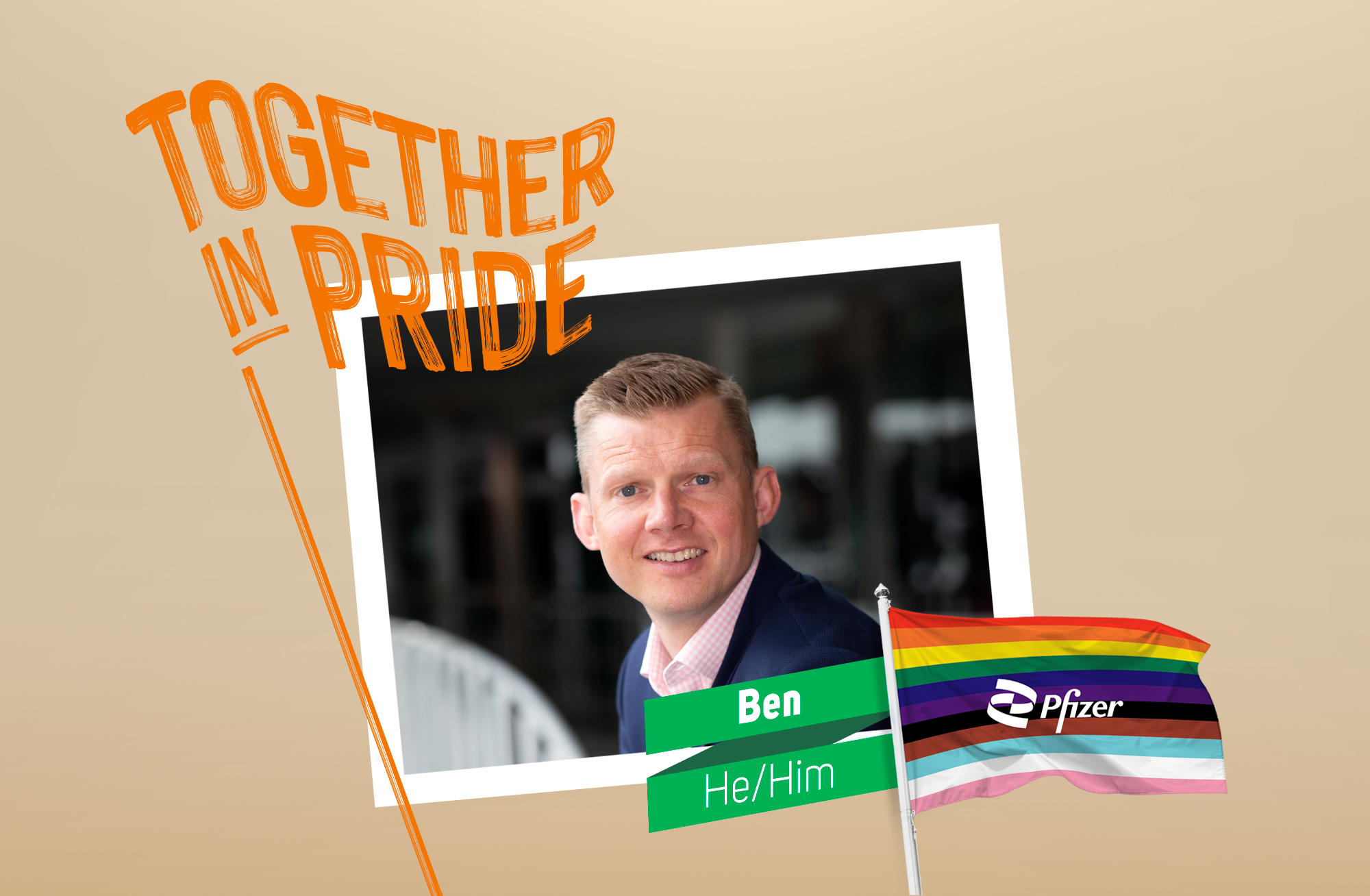
As an ally for the LGBTQ+ community, I am both honoured and delighted to have been asked to contribute the foreword for this year’s OPEN Global Pride Journal. In considering the words to share with you, it has given me time to reflect on this year’s theme of "Together in Pride" and what this means for our colleagues, culture and values, and the role I can play.
Pride Month is an opportunity for us to come together in celebration of diversity, unity, and authenticity. Our commitment at Pfizer to fostering an inclusive environment where everyone feels valued and respected is unwavering. This Pride Month, under the theme "Together in Pride," we reaffirm our dedication to supporting the LGBTQ+ community within our organization and beyond.
Internal data from our 2023 Global DE&I Summit shows that 4% of our colleagues identify as LGBTQ+ and data from Gallup in March of this year shows that LGBTQ+ identification in the U.S. continues to grow, with 7.6% of U.S. adults now identifying as lesbian, gay, bisexual, transgender, queer or another sexual orientation besides heterosexual. But regardless of the percentage, our value of equity calls on us all to ensure that EVERY colleague is seen, heard, and cared for.
Reflecting on our journey, we've made significant strides in advancing LGBTQ+ equity. From implementing inclusive policies and benefits to fostering a culture of acceptance and understanding, we've created spaces where individuals can bring their whole selves to work. One powerful example of progress is the establishment of our LGBTQ+ colleague resource groups, providing a platform for advocacy, support, and community building. We now have over 45 OPEN chapters around the world in more than 25 countries on five continents.
However, our work is far from complete. Despite the progress we've made, challenges persist around the world, reminding us of the importance of continuous efforts towards equality and inclusion. Discrimination, both overt and subtle, continues to affect LGBTQ+ individuals in various aspects of their lives. Our LGBTQ+ colleagues can face discrimination, lack of legal protections, and microaggressions in the workplace and society. They may encounter challenges accessing healthcare, housing, and other essential services due to their sexual orientation or gender identity or expression.
It's imperative that we remain vigilant in our commitment to combating discrimination and creating a truly inclusive environment for all.
As we celebrate Pride Month together, let us recommit ourselves to the ongoing journey towards LGBTQ+ equity. Let us stand in solidarity with our LGBTQ+ colleagues, allies, and community partners, working hand in hand to build a world where everyone can thrive, regardless of who they are or who they love.
The theme of "Together in Pride" emphasizes the importance of solidarity and support from allies. We must actively work to understand and address the unique struggles faced by LGBTQ+ individuals, advocating for equality, inclusion, and acceptance. By standing together, we can help create safer and more inclusive environments where everyone can thrive.
Together in Pride, we can create a future where diversity is celebrated, equality is upheld, and inclusion is the norm.
In the words of Harvey Milk, a trailblazer in the fight for LGBTQ+ rights, "Hope will never be silent."
Let's march forward with hope, courage, and determination, knowing that together, we can create a future where diversity is celebrated, inclusion is the norm, and everyone can live their truth with pride.
Happy Pride Month!
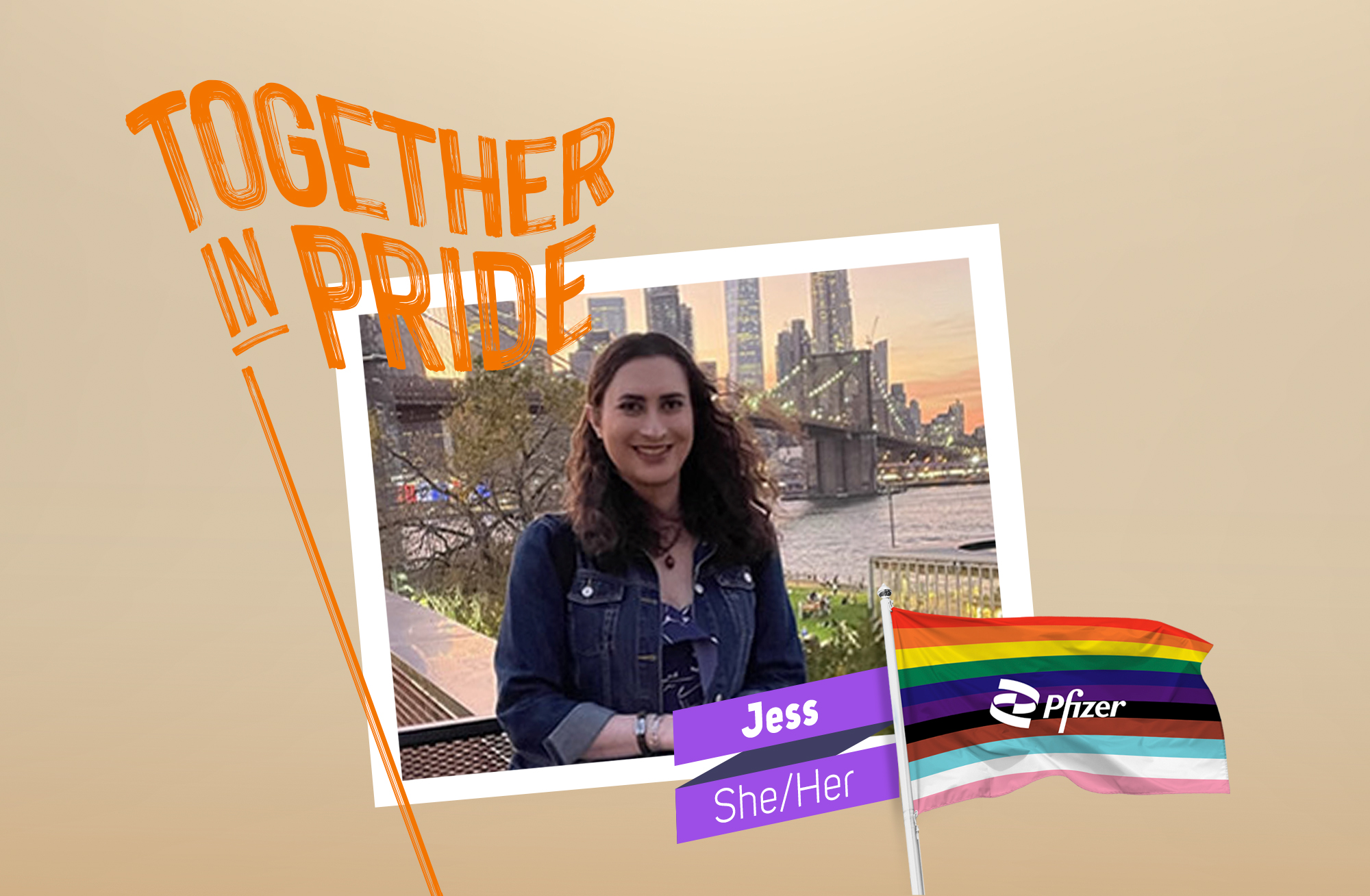
There are a lot of different journeys for trans and non-binary folks. Some people know their gender identity doesn’t match their sex assigned at birth at a very young age, but for me, it wasn’t as clear. I didn’t experience the intense gender-related distress – often referred to as gender dysphoria or gender incongruence. In hindsight I can see many obvious signs, but as a kid I didn’t have a clear, internally driven sense of why I felt “off.”
Growing up in the 80’s and 90’s, the few times I saw a trans person on television or in the paper, it was as a source of prurient novelty or an object of ridicule: a shameful secret or the punchline of a joke.
I know now that there were amazing people living their best, gender-expansive selves at that time – indeed, throughout human history – but I wasn’t encountering their stories as I grew up. With no encouraging external references and my fairly mild dysphoria, I was left feeling like I was unknowably broken, and shamefully buried my “what if I was a girl” fantasies in the back of my mind.
Decades went by before I gradually began to run across positive trans representation in the world. Just a few glimpses were enough to resonate with that locked-away, secret part of me, and started me on a path to educate myself and seek others like me.
More critically, I took those favorable portrayals of trans people as a sign that society was becoming more accepting. Transitioning went from a distant hope to a feasible reality. To test the waters, I came out to two close friends at Pfizer in 2016, both of whom were a part of the LGBTQ+ community. Sadly, too few trans people live or work in accepting environments, so it was a relief to learn my colleagues would not only be supportive, but actively joyful to meet the true “me.” And that cheerful attitude was shared not only by colleagues within the community, but also by straight allies at work.
Finding new communities, sharing with close friends, coming out to family, entrusting myself to more colleagues, meeting with medical professionals and prayerful self-reflection culminated with my coming out to everyone late in 2023.
Now that I’m out and finally contributing to the Pride Journal, I’m conscious of how essential the notion embodied in this year’s theme - Together in Pride - is, both for my journey and for others like me. After all, I didn’t suddenly decide to transition out of a vacuum: the visibility of other trans folk, the feeling that there was increasing societal acceptance, and the knowledge of likely allies and protection – especially at Pfizer – were all critical to finally accept and live as the truest version of myself that was always inside me.
Sadly, we are seeing an ebb in that rising tide of acceptance lately, as anti-trans and anti-LGBTQ+ rhetoric and legislation spike around the world, flying in the face of serious medical study. Even as recent polling shows more and more people identify as LGBTQ+ – nearly a quarter of Gen Z in the U.S. vs. 4.5% from my generation of Gen X – hundreds of bills are being introduced and passed limiting our freedoms and right to exist.
After decades of struggling to find the true “me,” I’d be lying if I said I wasn’t scared. But I do see cause for hope.
There is a phenomenon from the past that comes to mind: In the early 1900’s, roughly 3% of the U.S. population was left-handed. By the 1950’s, 12% reported being left-handed. That surge didn’t happen because of a “left-handed social contagion” or because being left-handed was a “trend.” It was because the societal stigma and punishment for being left-handed eased up during that time, allowing people to finally be who they always were in public.
I’m not trying to suggest that left-handedness faced the same kind of pushback that trans, non-binary, gender-nonconforming, and LGBTQ+ rights face today. And finding that plateau won’t come easily: we have a duty to fight for the dignity and validity of trans people in the present, particularly given the overwhelming medical and scientific consensus supporting the validity and reality of their experience.
But through and beyond that fight, I see hope.
I see it in those polls revealing the true percentage of LGBTQ+ people in the world generation by generation.
I see it in the medical and scientific professionals pushing back on the falsehoods driving misinformation and legislation.
I see it in the support of colleagues, leaders, friends, and family standing by people like me.
And I see it in the personality and values of our science-first company: daring, focused, compassionate, and spirited in defense of our values of Courage, Excellence, Equity, and Joy.
The human condition has always been a beautiful, complex, messy reality. As a trans person I can attest to just how wondrously, confusingly messy it can be! But I know that condition can keep improving – keep bending toward justice, equity, and freedom – if we all stand Together in Pride.
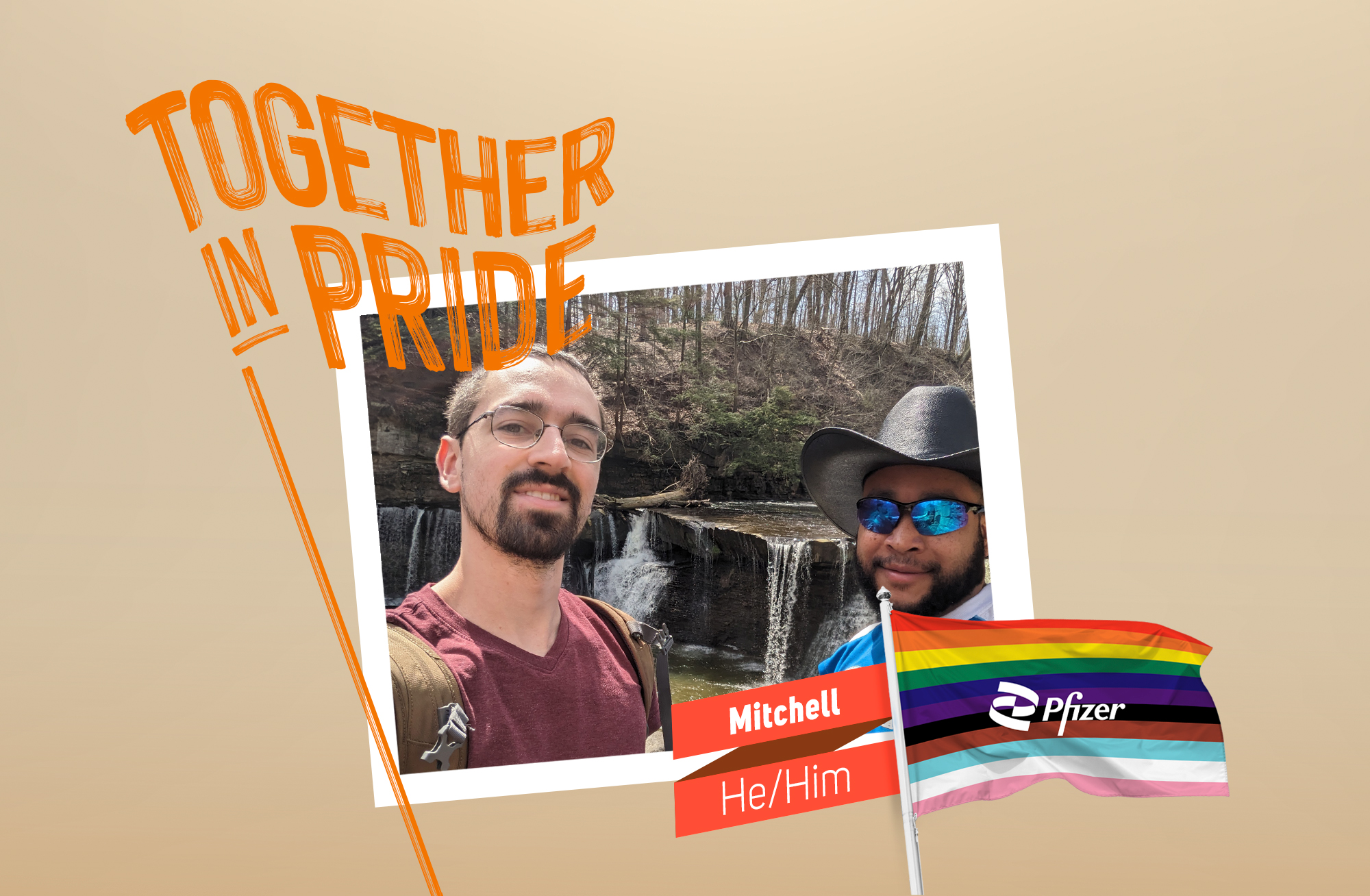
Where do I begin? Let’s think about the theme – “Together in Pride.” But what exactly does it mean to be together in pride?
I know what it’s like to not be Together in Pride. I grew up in a very rural area, outside a city barely large enough for a grocery store. I sometimes felt isolated – it was just me and my brother, who was a whole seven years older than me. We never really saw our neighbors, and none of them had kids our age to play with. When it came to making friends, it was either through school or church.
I vaguely remember the first time I ever heard queerness mentioned: me and my parents were watching TV and the newscasters were talking about Matt Bomer coming out as gay. I was 13 years old at the time and didn’t really know what it meant. Before that, I had only heard it used as an insult by all the kids at the middle school. It would take a couple more years to fully contemplate my sexual orientation and realize that I was gay.
I ended up stumbling across a Facebook page around the same time called “Have a Gay Day.” Through this page, I learned two important things: that these feelings I was having were real and valid, and that I was not alone. This was the first step to being together with pride – recognizing that I was a part of this wonderful and loving community.
Even once I discovered I was gay, I still was hesitant to admit it to anyone. I came out to my parents around the age of 15 and was met with some skepticism - I did come out on April Fool’s Day after all. But they soon came to accept that this was a part of who I am. I was very scared to come out to my peers though, because I didn’t know if those same kids who threw around “gay” as an insult in middle school had grown enough to accept me. It wouldn’t be until my junior year of high school that I was brave enough to say the words out loud to someone from school.
I ended up finding a couple of other LGBTQ+ individuals in the school like me, and I was exhilarated. I finally had people I could talk to about my sexual orientation without the fear of being judged by others.
Once I found these people, we decided we would eat lunch together every day. This was the next step to being together with pride – slowly building a community with those around me, no matter how small. Our town may have had less than 5,000 people, but that still didn’t mean I was all alone.
Then came college, and I was forced to have to come out all over again. As with most things, it gets easier the more I did it, and this was no exception. This time, it only took a few months before all my good friends knew. Still, it was hard sharing this, especially when I didn’t have an easy way to bring it up by saying something like “my boyfriend.”
I started working at Pfizer right after I graduated in 2021. I was still single at the time and didn’t have an easy way to come out then either. I wanted to be out to my colleagues so I didn’t have the weight of a “secret” hanging over me. A lot of the people I was working with were blue-collar and I didn’t think they all would be as accepting as my college friends. I didn’t want to rock the boat and risk negatively changing people’s attitudes towards me, so I kept quiet for quite a while. If anyone asked, I told them I wanted to keep my personal and work lives separate, which most people respected.
But as time went on and I kept seeing the efforts Pfizer has been making towards Diversity, Equity, and Inclusion, especially related to the LGBTQ+ community, so I became a little bolder. It started with just a couple people that I knew I could trust. Then I started dating my now-boyfriend and suddenly everybody started to hear about it. I was surprised to see that the response to my coming out has been overwhelmingly positive. I It just goes to show that the strides we have been making affect everybody within and even those outside Pfizer so that I could be myself without any issues.
So, what does it mean to me to be together in pride? Well, first it means to know yourself and accept yourself for who you are. The next step is to open yourself to others to let yourself be known. Then once you’ve done that, you can slowly let your light shine for the whole world to see. Never let someone else dim your light. You are brilliant, you are wonderful, and you are loved.
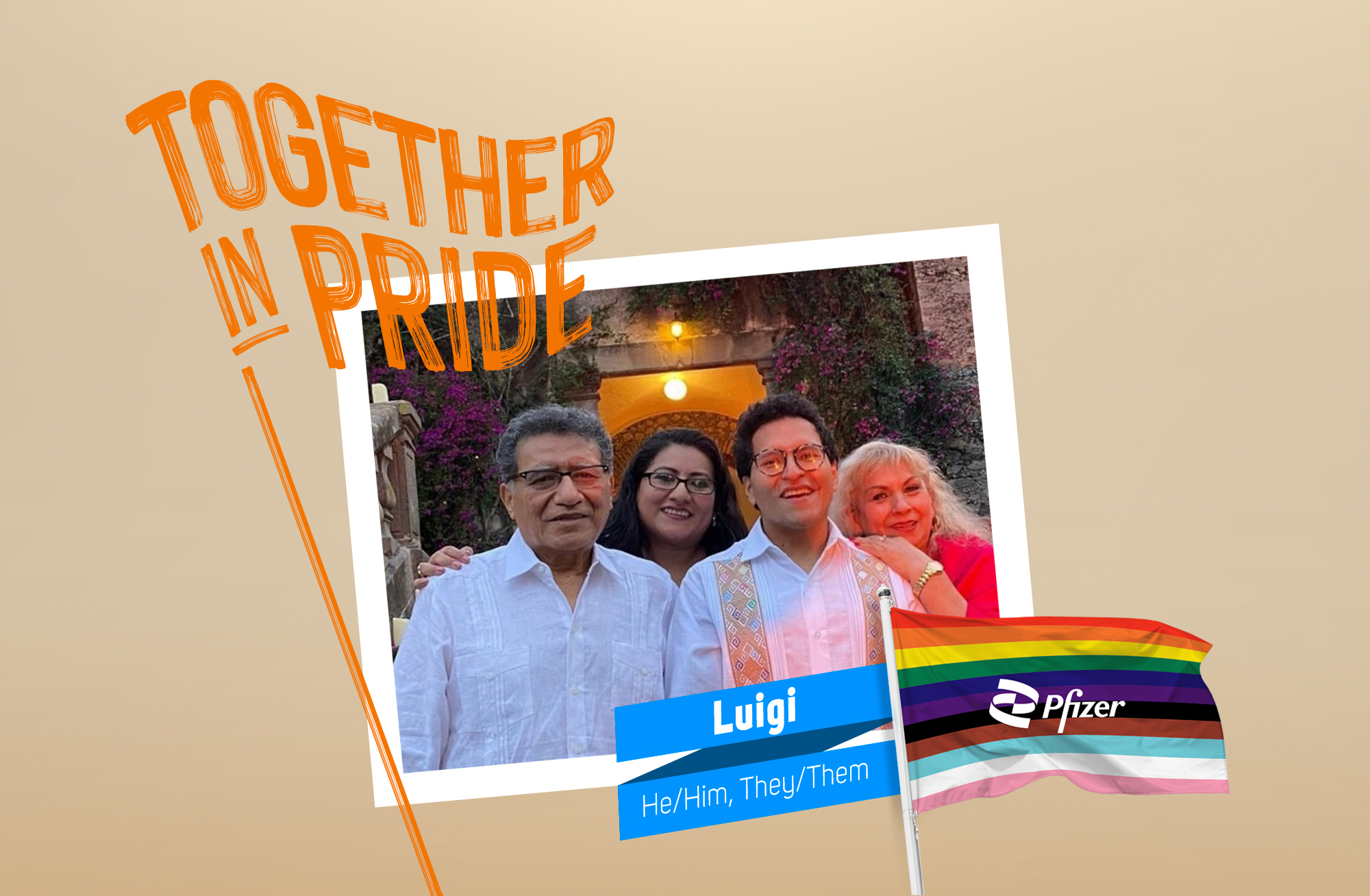
My father passed away six months ago at the age of 75. It seemed like his health was fine, but a heart attack took him away. On December 2, 2023, the lives of my sister, my mother, and myself took a 180-degree turn. At the moment of his death, I found myself contemplating all the future plans my father would no longer experience in physical presence by my side: my MBA graduation, meeting my future boyfriends, being at my wedding (if I ever get married), and witnessing countless projects we had discussed. Long story short, a multitude of pending moments that will ache without him.
I still remember when I talked to him and my mom about coming out when I was 22 years old. Surprisingly, my father took the lead during that moment and said to me, “My beloved son, your mother and I will love you forever because we know the person we have raised and the legacy we will leave.” His words deeply moved me. I saw a loving, understanding, vulnerable father, but also one who worried about my future. That was just the beginning of a long journey of acceptance for my family, with highs and lows in the process, especially for my parents.
In retrospect, I understand how challenging it can be for many people to accept a process completely foreign to their ways of thinking. And undoubtedly, it’s equally complex for us to recognize that such a process will take time. My parents were born into conservative families, like most Mexican families of that era. Being gay during those times was a source of ridicule and shame. While my family was respectful toward other members of our community, experiencing it within your own family nucleus presented an entirely different landscape.
Today, more than ever, I have compassion for the paths of acceptance our parents tread. And that same compassion made me realize that their concern wasn’t about me being gay, but rather the fear of potential dangers I might face by openly expressing my homosexuality in a macho-dominated social circle. In short, it was love and aversion to acceptance that created resistance, something they likely anticipated for many years. Fortunately, time and information helped us understand each other and love one another with deep empathy.
As long as I can remember, I’ve known that I’m gay. After years of hiding from bullies, criticism, and hurtful words that wounded me more than a physical blow, I’ve come to see that those wounds have transformed into courage, empowerment, gratitude, and immense affection from the people surrounding me in my current life. Today, thanks to the freedoms I feel living in my beautiful Mexico City, working at Pfizer, pursuing my master’s degree within an incredible group I’m fortunate to study with, and most importantly, choosing the people who have become my family, I’ve been able to fully embrace my authentic self. In this world of possibilities, being vocal about our identity opens countless doors filled with opportunities. My queer side, my way of expressing myself, and proudly showing the world that I belong to the LGBTQ+ community have become my superpower. As I progress in my professional career, I feel a strong responsibility to pave the way for future generations with even greater freedoms than I experienced. My heartfelt wish is that the small contribution I’m making to society will multiply in a world free from prejudice and fear of sharing our genuine identities with others.
Today, and for the rest of my days, I will honor my dad’s life with the love I always felt from him. I’ll carry that love forward to my mom, my sister, my dogs, my friends, and every member of the community who needs those words of encouragement my dad gave me. Those words granted me superpowers, making me feel a little more whole and secure each day. It’s time to fill our ranks with more superheroes who pave the way for a future brimming with love and brotherhood, and it’s up to us to make it happen.
I love you, Dad. This one’s for you.
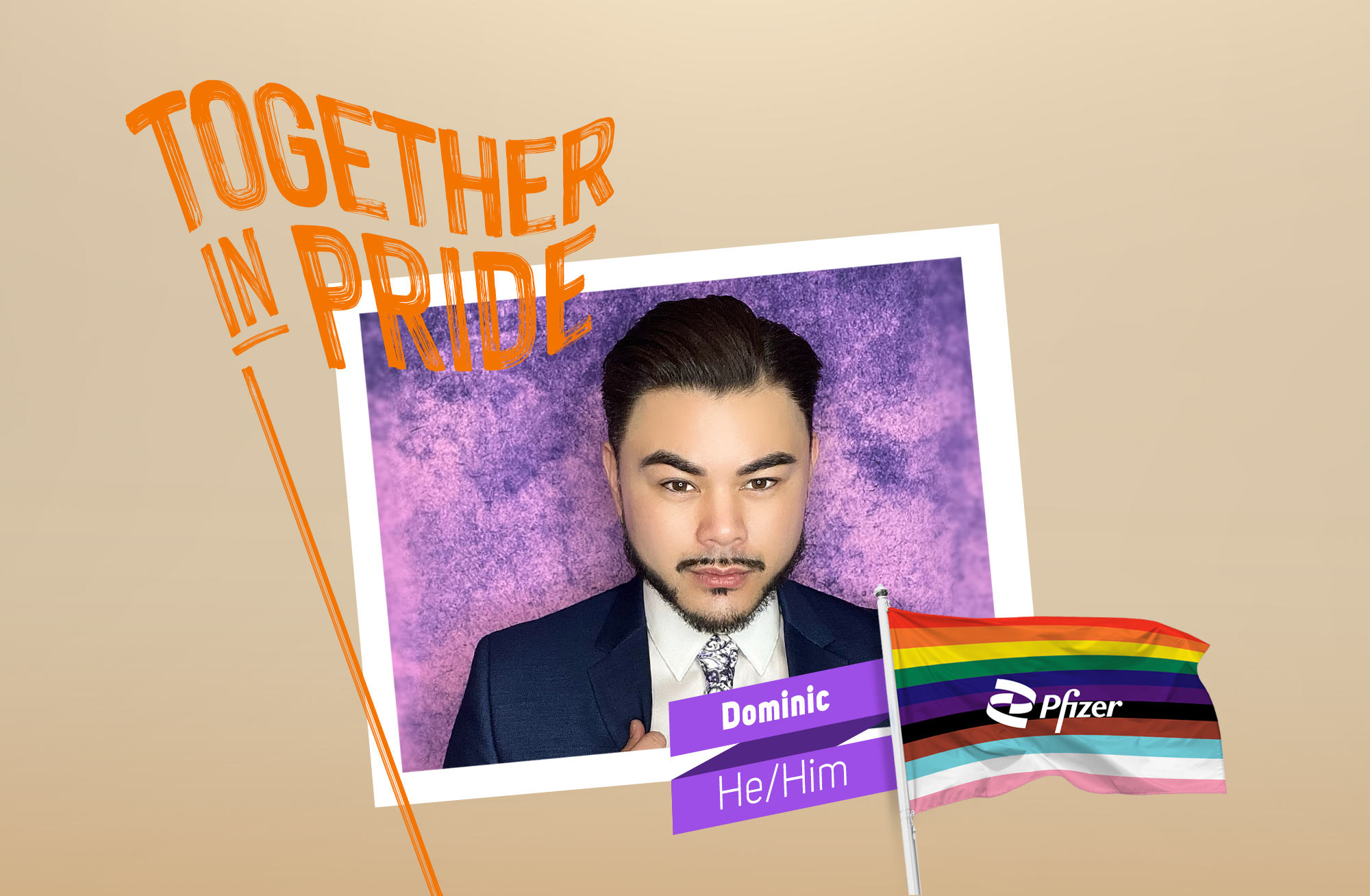
This is me. I am an Asian American with a disability who belongs to a minority group and actively supports the LGBTQ+ community. I grew up poor and fought and worked for what I believed in. I was different, and as I grew up, I was aware that several factors had contributed to my differences. I have identified as gay for as long as I can remember. Throughout elementary, middle, and high school, I was terrified to come out for fear of being judged and perceived as different.
Being gay used to make you an outsider, and some people felt it was a virus. To impress my friends and family, I had to conceal my sexual orientation by appearing to have heterosexual relationships. I was frightened of being turned away if I revealed my sexual orientation. Coming from a Filipino family, children are expected to excel academically, graduate from college, marry, have children, and live happily ever after. I excelled in school and graduated from college, but I never married or had children of my own.
During my senior year of high school, I attempted to make my sexual identity more apparent. I modeled my behavior after what was thought to be "gay" habits. At the age of eighteen, I had my ears pierced, dyed my hair unusual colors, and dressed in distinctive or flamboyant apparel that differed from what the "normal guys" wore in high school. I planned and strategized on how I would reveal my sexual identity to my mother, until one day, I found the confidence to tell her while she was preparing dinner. "Mom, I'm gay and I like men."
I will never forget how she responded: "I know, and I've known all along, and it's okay; I love you. My son, I want you to be happy. Dinner should be ready within a few minutes."
I was confused. I expected hell to freeze over or the crucifix on the wall to be flung at me since it was against our beliefs. But, at that moment, a breath of fresh air was released from my lungs, something I had been seeking for years. I wailed like a baby and I could feel my mother's arms around me, holding me tightly. Because of the support from my mother, I am who I am today. Because of her confidence in me, I came out to my friends and family, and they embraced me lovingly. She was always proud of me.
My mother planted the seed in me, and I now advocate for the LGBTQ+ community.
I am currently completing my Doctorate in Education Organizational Leadership with an emphasis on Organizational Development. My passion is to hear, listen, and assist individuals in the LGBTQ+ community so they can be heard, and to advocate for them. Together in pride, I am here to water the seeds that are waiting to bloom in a field of lovely flowers.
Through challenges, struggles, and acceptance, I discovered my genuine self.
This is me.
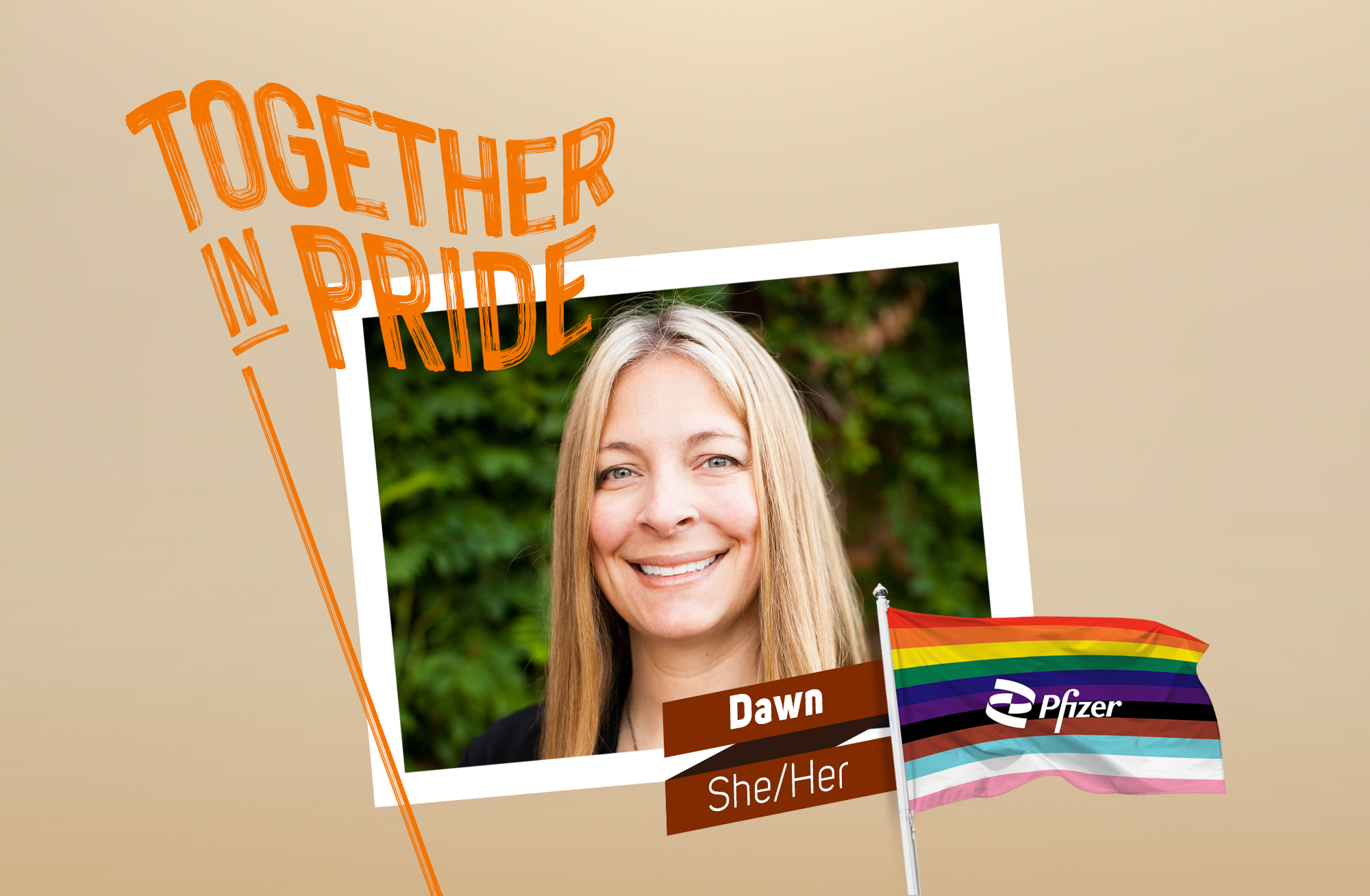
In a world where authenticity is often challenged, I stand firm in my commitment to supporting the LGBTQ+ community. For me, being an ally goes beyond mere words – it's about action, empathy, and creating an environment where everyone feels valued and respected for who they are.
At the heart of my allyship is the belief that everyone deserves the freedom to express their true selves without fear of discrimination or judgment. Whether you're gay, lesbian, bisexual, transgender, queer, or any other identity under the LGBTQ+ umbrella, you have the right to bring your whole self to work.
I understand that coming out and being open about one's identity can be daunting, especially in a society where prejudice still exists. That's why I strive to create a workplace where inclusivity isn't just a buzzword, but a lived reality. Whether it's advocating for gender-neutral bathrooms, implementing diversity training, or simply lending a listening ear to my LGBTQ+ colleagues, I am dedicated to fostering an environment of acceptance and understanding.
But being an ally isn't just about supporting LGBTQ+ individuals when it's convenient – it's about standing up against discrimination and injustice wherever and whenever it occurs. Whether it's challenging harmful stereotypes, speaking out against homophobic or transphobic remarks, or advocating for policy changes that promote equality, I am committed to being a vocal ally both within and outside the workplace.
I recognize that allyship is a journey, and I am continuously learning and growing in my understanding of LGBTQ+ issues. I am open to feedback and eager to educate myself on how I can better support my LGBTQ+ colleagues and friends. Ultimately, my goal as an ally is simple: to create a world where everyone feels safe, valued, and empowered to live as their authentic selves. Because when we embrace diversity and celebrate difference, we all thrive.
Together, let's continue to build a future where love is love, and everyone is free to be who they are, without apology or compromise.
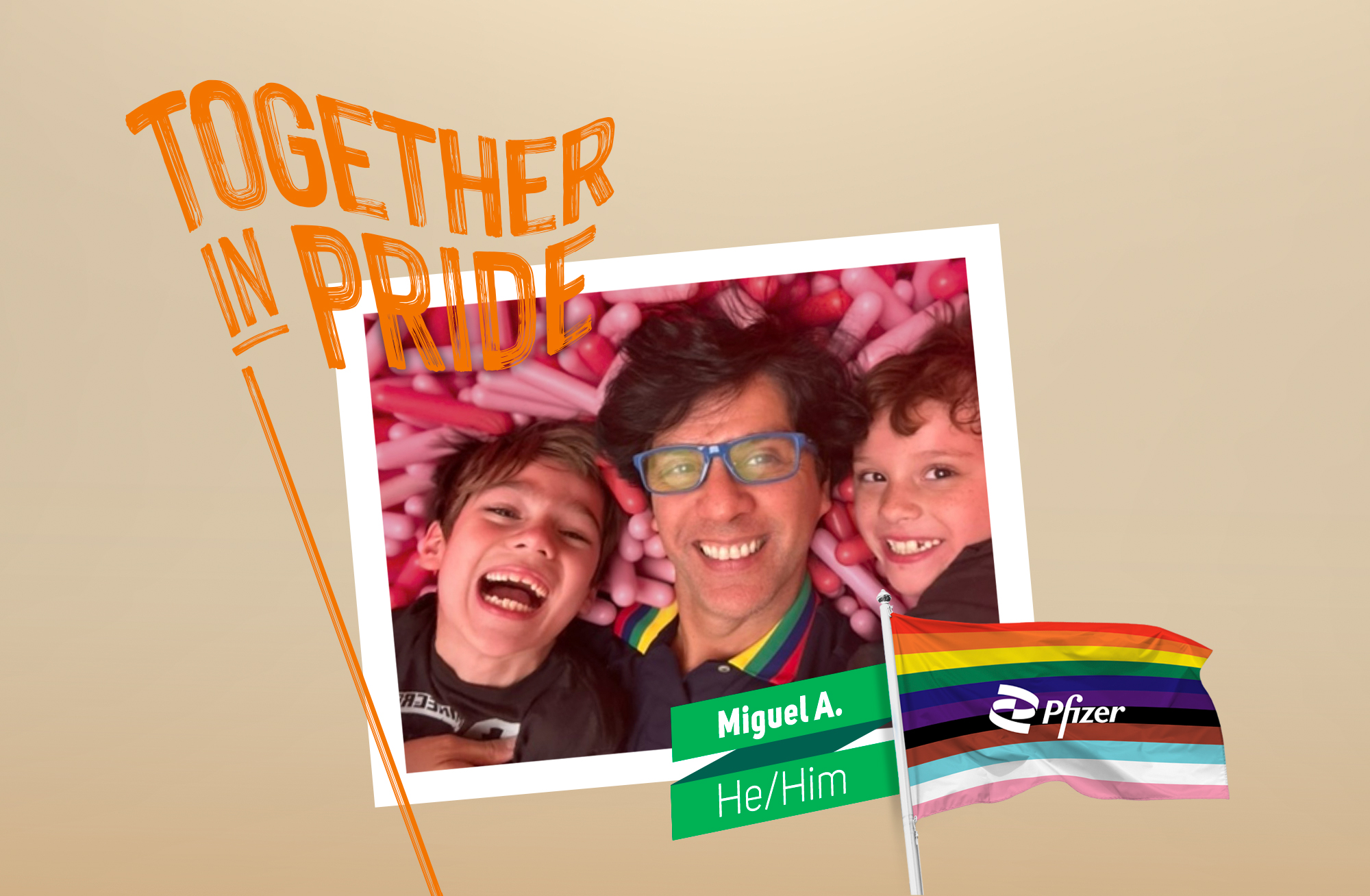
My story started many years ago, in Buenos Aires, Argentina. I grew up in a great city during times when being yourself was still not very well received, especially regarding sexual orientation. Bullying at school and even at work was tolerated and, moreover, created a sense of belonging for the bullies by making others feel even more alone.
I had great, loving parents. My father was raised in the province of Cordoba, where people are very family oriented and happy in general. I grew up with my identical twin brother, an older brother, and a sister.
My mother, born in Buenos Aires of Italian descent, was a very loving and dedicated mother. Both of my parents instilled in me great family values, work ethic, merit-based efforts, and a sense of community and helping others. They both inspired us to have dreams and pursue them in life with resilience and dedication.
My sexual orientation was not an issue with them (although it was at the time for others in different environments). And even though they did not know how to talk to me about it, they always showed me unconditional love.
When I decided to move to Canada in 2001, it was not easy to leave my comfort zone of my family and close friends. But Canada was a great country that embraced me for who I was, and I loved living, working, and making friends and partners there. My transition to the U.S. was easier in some aspects. My twin brother was already living here and that made my transition less stressful. But it still did not feel comfortable being completely out at work.
I felt my life was missing something, but I could not understand what that was. It was while studying in a Leadership course at Columbia University that the professor taught the difference between having life goals vs a life purpose. Taking the time to reflect and reconnect with my youth and family values made me understand what my purpose really was: being a father.
Having seen my brothers and sister forming such beautiful and loving families and having my parents’ example made me understand that I have lots of love to give and that was the experience I wanted to pursue.
It was through a long surrogacy journey with several ups and downs (where resilience and persistence were key) that I finally made my purpose real: in 2016 my twin boys, Aaron and Luca, were born.
They not only give me purpose but also continuous happiness in my life. They are both such loving, energetic, and curious boys that it’s made me feel much more energetic and alive than I usually am.
Hopefully I will be able to inspire in them the values of dreaming big, being their authentic selves, having strong family values, and practicing equality but, more importantly, empathy and thinking about others.
Professionally, it was when I joined Pfizer in 2016 that I really felt I could be me. Pfizer and the Regulatory Quality Assurance group I work for made me feel so at home and included and supported me to be my authentic self. That makes me feel very empowered and motivated, and hopefully, motivates others.
Joining the CRG groups made me feel included but also allowed me to try to give back some of the experiences and try to help others through different challenging journeys.
Thanks to Pfizer for all these great initiatives, fostering a culture of diversity and inclusion, and making a great environment to shine and be yourself.
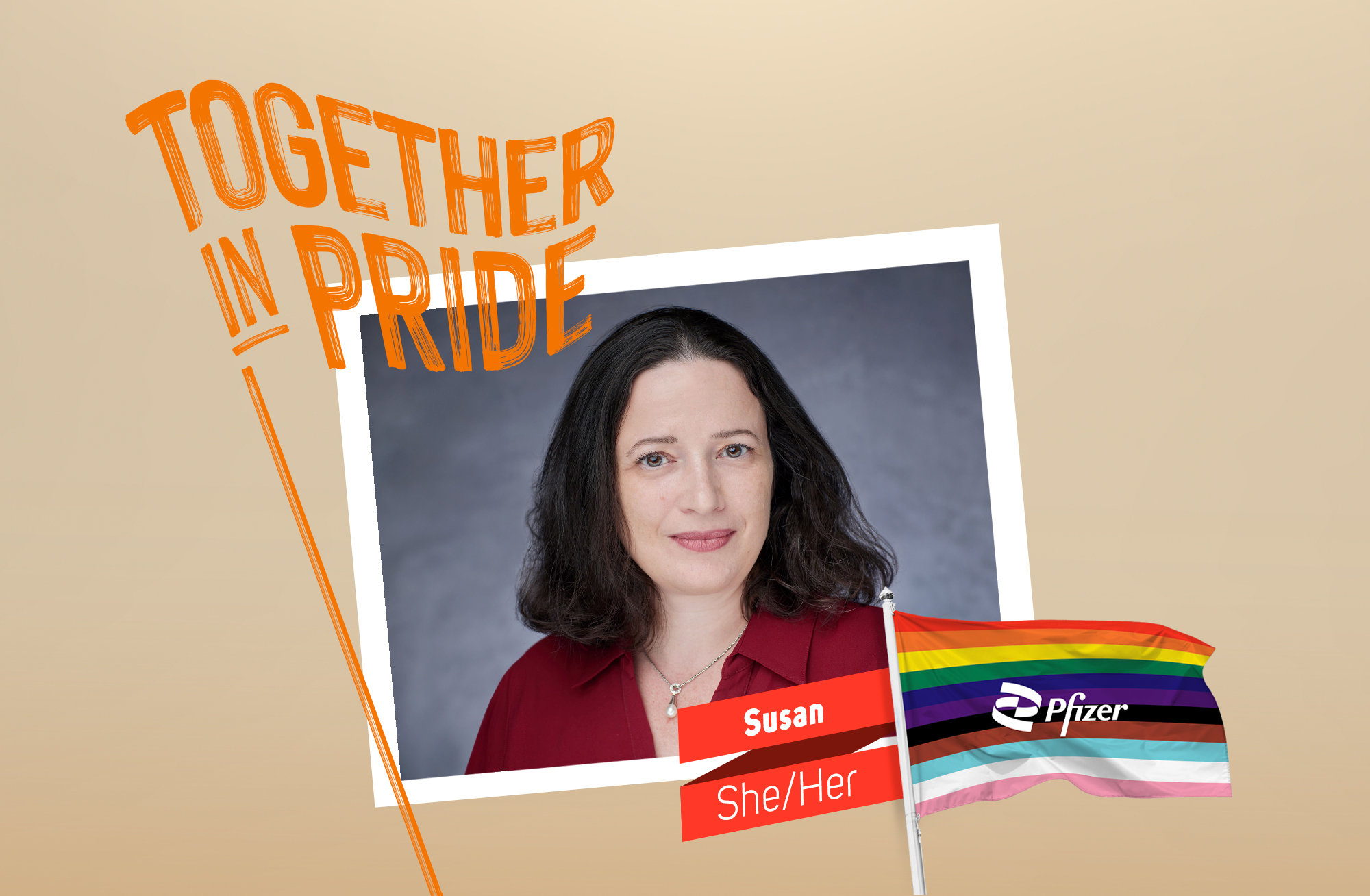
Many fairy tales demonstrate the power of naming, where being able to name something allows the hero to have power over the thing being named. Think of Rumpelstiltskin being thwarted when his name is spoken.
When I was growing up, I had no name for what I was feeling or for how I wanted to interact with those around me. Everyone was assumed to be straight; that was the default. My friends would giggle over boys with the conversation revolving around holding hands with this boy or kissing that boy. There was no other discussion, no other models or examples. And it was fine because what else did I know? It didn’t seem quite right but it didn’t seem wrong, either.
I had no name for what it meant when I wanted to be close to a female friend of mine – when I wanted to hold her hand or sit close to her. When she went away to college, she wrote and taught me the words “gay” and “lesbian.” They were good words, words to turn the unknowable into the known. It was turning on a light in a dark room, and I could see what had been obscured.
But it still wasn’t quite right.
I think my first understanding of bisexuality was through a fantasy novel, where a character was attracted to men and women and that was okay. The very idea was a shock. Wasn’t everyone supposed to be one way or the other? If being gay was on the fringe, then being bisexual was off the edge of the map. It was the area labeled “here be dragons” that no-one would believe existed. But it felt more right than anything else and I wouldn’t let anyone take the word away from me. I named myself “bisexual” and started to build relationships around that understanding.
Those relationships never worked and I struggled to understand why. My name for myself was right – I knew that it was – but it was also clearly wrong. As the years passed, I would learn a lot of new words that I would try on and take off like an ill-fitting jacket. It wasn’t until the last few years that I found a name for myself that was exactly right, that gave me power over myself.
If “gay” was turning on a light in a dark room, then “grey asexual” was stepping into the sun. When I said the words aloud, I felt like I was reclaiming myself. It meant that I could be attracted to men and women but only sometimes and that most of the time, I was attracted to no one at all. I had a real name and a real place. There wasn’t something wrong with me.
As I get older, the more I understand the value of community and visibility. I would never have heard these words without someone showing me the way. I would never have been able to articulate why I felt the way I did and would never have known that it was okay.
Together, we have created a map with no unknown places. There are no dragons, no monsters. There is only a place that each of us needs to find for ourselves. There is only the name that we need to give to ourselves that is right and true.
My name is Susan and I am grey asexual. It is a pleasure to make myself known to you.
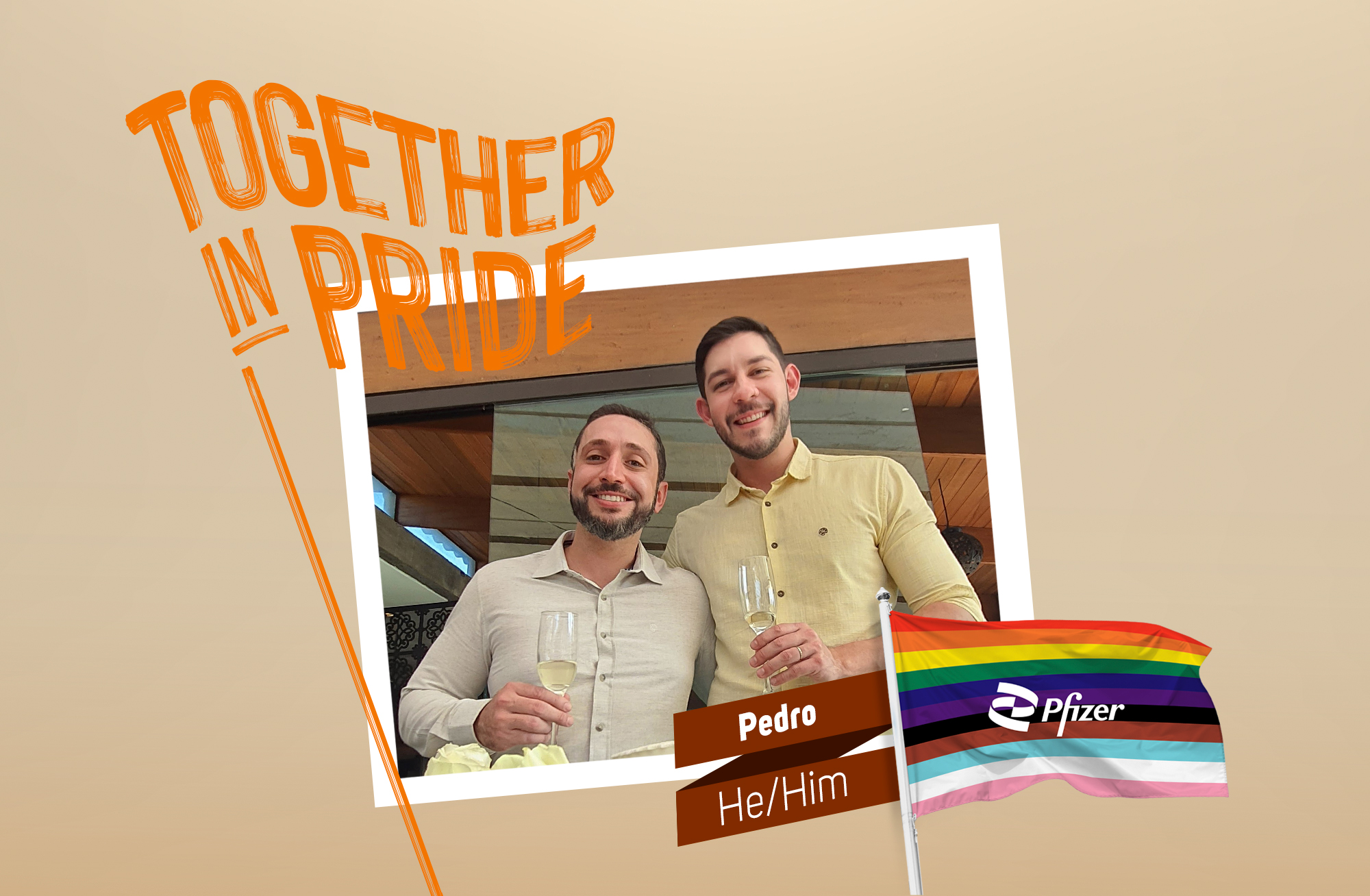
I’m from São Paulo, one of the biggest cities in South America. My mother was an elementary and high school biology and a sexual education teacher and my father an engineer. I’m three years younger than my brother and six years younger than my sister.
As I grew up I always noticed that I didn’t quite follow what was expected for a boy, and when I did it was almost as if I was mimicking my older brother. Deep down I knew that wasn’t who I was. When I was around 10 or 11 my cousin, who was 17 at the time came out as a lesbian, and it was a shock to the whole family. My uncle and aunt expelled her from their house and I just couldn’t understand why. When confronting my family the only answer I received was: “When you get older you’ll understand.” I do understand it now. This was the first time that I realized that what I felt should be kept to myself.
Adolescence came and I started to have the feelings for boys, so I tried to keep that to myself. It was almost impossible, so I had my first kiss with a boy. After that I was so ashamed, thinking that I was doing something so wrong, that I would go to hell. I started participating more in the Mass; helping the church in their meetings; becoming an altar boy; and I even thought of becoming a priest if I were to receive the miracle of not having those feelings anymore.
At home, in school, on the streets and on TV, I remember hearing the word “gay” as if it was something bad. As many other LGBTQ+ people, I started saying the same things just to keep myself off the radar. Once in college I met a friend from high school and during the dinner she said, “Pedro, remember my boyfriend I used to talk about? It was in fact a girl.” I was so happy and proud of her, that I didn’t even think and I said, “So, I think I like boys.” That was the first time I was saying it out loud.
Time went by and I grew up. I met a girl and felt completely in love. We started dating, got engaged and got married. During this time I joined Pfizer, in the SCMOQ team. We had after work happy hours together, and we met everyone’s family. The whole team got to know my wife. During the same time, as I became an uncle to both my sister’s and brother’s children, something clicked for me. I started remembering all the thoughts I had growing up that I had to hide, and I decided it was time for me to accept my true self.
First I told my sister, who was very supportive, and then my mom who said that classic sentence: “I always knew.” Then I told my brother who just hugged me and asked what I wanted from the grocery. As I was going through my divorce, in our team meetings we were discussing Pfizer’s principles of Head/Heart/Guts. during one of those meetings the topic was prejudice in general, and when the slides were about LGBTQ+ issues, I felt so safe at that time that I told my team that I was getting divorced because I had finally accepted my sexual orientation as a gay man. They were the first ones outside my family to know the reason for my divorce.
They have all showed so much love during that day, with messages after we clocked out and constantly checking on how I was feeling. Until now I haven’t really shown how grateful I am for all of them. I do think that was the blessing I was asking for as a teenager. So, to the team who showed love and support when I needed it most, a huge thank you!
Now I’m happily married with a family who accepts me, a husband who I love and loves me back, and with a needy dog to complete the happily ever after ending.
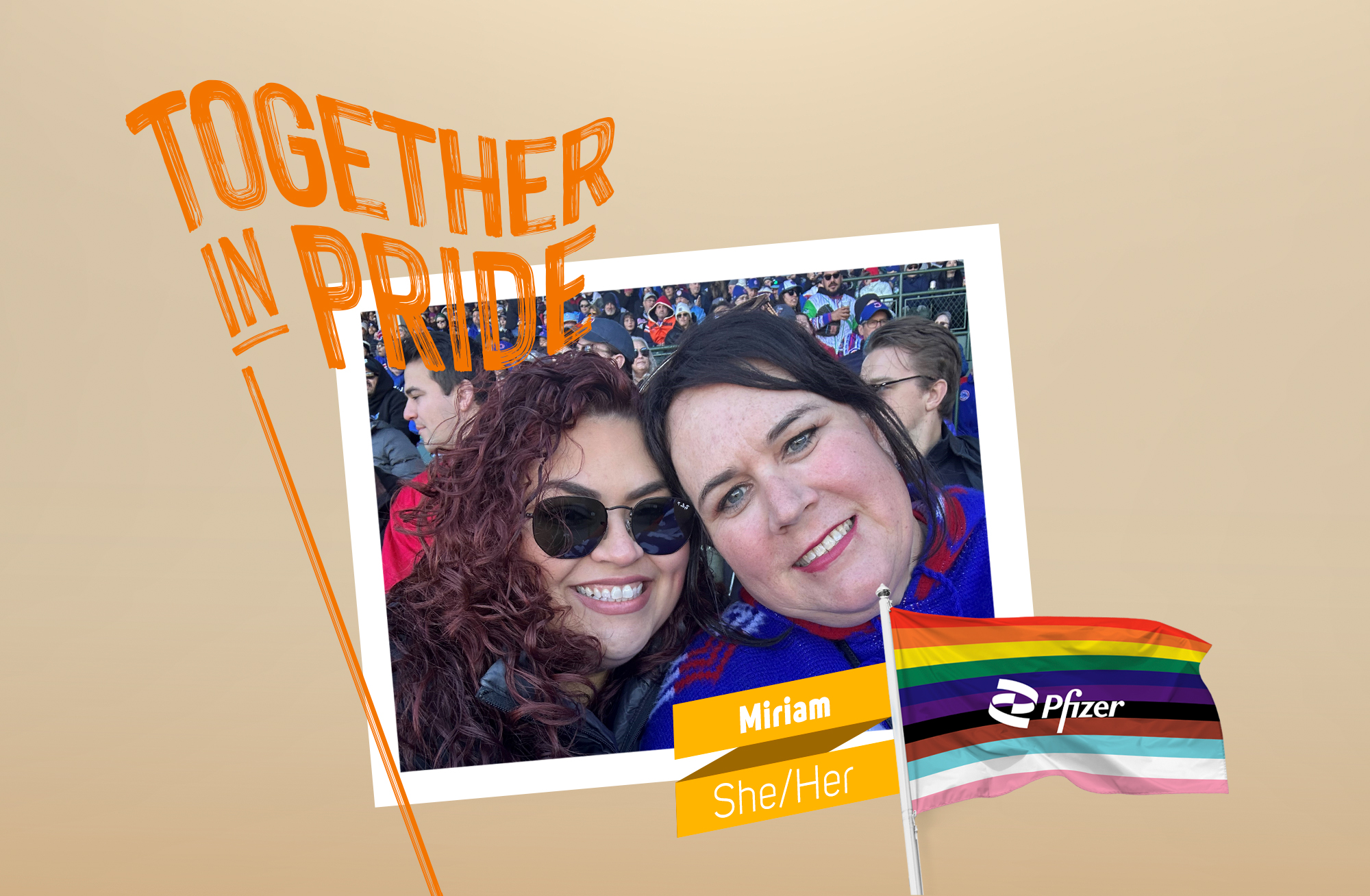
As I embarked on a new chapter in my life, being relocated to Chicago for my current role during the pandemic, I felt a mixture of excitement and apprehension. Being from Puerto Rico, I’ve always wanted to live in a big city and have different experiences, meet new people, and discover other cultures that overwise I would never know. The Windy City awaited; however, I didn’t know a soul and after the pandemic the world had changed more than I ever thought it would. Little did I know that amidst the challenges of isolation and unfamiliarity, I would find a beacon of light and support in my darling friend, Daisy. I met Daisy online, she was a transgender woman looking for friends in the city, same as me. I’ve never known a trans person before, so I said, “Why not?” From the moment we started chatting, her warmth, humor and authenticity shone through. She was so funny and had puns for everything. The first time I met her in person was on my birthday and she went above and beyond. I learned about her journey as a trans woman and the struggles she faced. This included balancing the life she couldn’t leave behind with her children and her co-parent while living her truth, with importantly a resilience that defined her spirit. Daisy's friendship quickly became a lifeline for me in a city where I knew no one. Her willingness to listen, empathize, and share her own experiences helped bridge the gap of loneliness I felt. Despite our different backgrounds and gender identities, our bond grew stronger with each passing day.
As our friendship blossomed, I became very much aware of the privileges I held as a straight cisgender woman. Daisy's openness about her challenges navigating the world as a trans woman shed light on the systemic barriers and discrimination she faced daily. It was a humbling realization that compelled me to reflect on how I could leverage my privilege to support her and other transgender individuals. I am educating myself on issues facing the LGBTQ+ community, including the importance of allyship and advocacy. I vowed to use my voice to advocate for inclusivity and equality in every aspect of life.
In Daisy, I found not only a friend but also a mentor, a confidante, and a kindred spirit. Our journey together reminds me of the importance of human connection and the transformative power of friendship. As we celebrate Pride, I am grateful for the opportunity to stand alongside Daisy and all those who continue to fight for love, acceptance, and equality.
When I saw the theme for this year’s OPEN Pride Journal, I couldn't help but reflect on the profound impact Daisy has had on my life. Her friendship has saved me from myself, and she’s taught me invaluable lessons about empathy, compassion, and solidarity. Together, we are stronger. Together, we embody the theme of this year's Journal: Together in Pride.
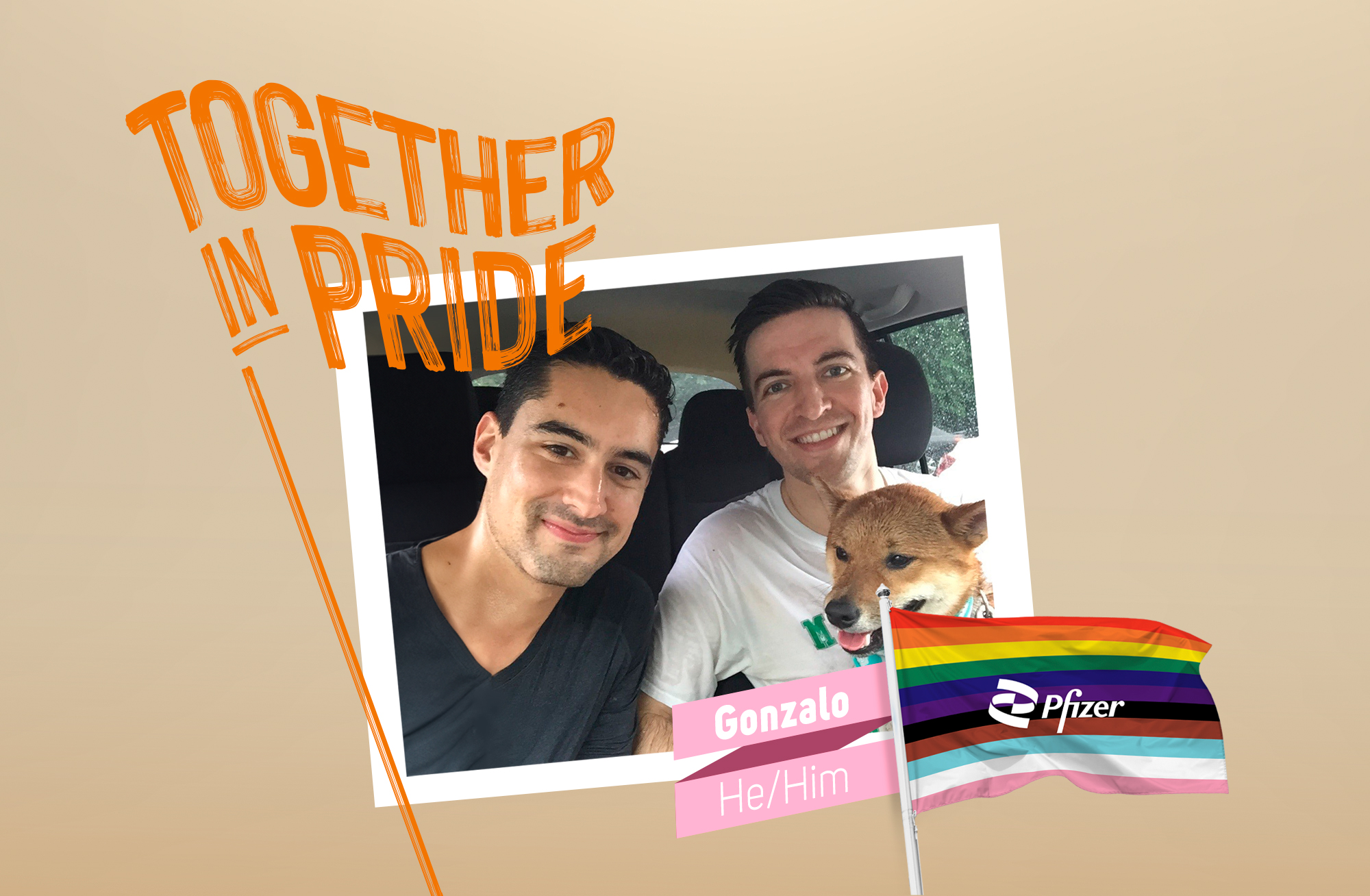
As many LGBTQ+ folks can attest, being closeted early in life (both personally and professionally) can leave one feeling isolated, which is why this year’s theme of “Together in Pride” resonates deeply with me, as it captures the indispensable need for community and allyship.
My coming out story is like that of others who had a similar upbringing as me. I grew up in a conventional, Hispanic family and it took me some time to accept my truth. But, when I finally did, I was met with an outpouring of support. When I was 27, I tragically lost my sister to cancer. My biggest regret in life is not telling her I was gay before she passed. I know that she would be deeply proud of her brother, and the wonderful life he’s had, with his partner of seven years.
Having been at Pfizer for just over a year, I’ve had the tremendous privilege of visiting many of our PGS manufacturing sites, both domestically and internationally. One of the things that has always stood out to me is just how proud all our sites are of their LGBTQ+ colleagues.
As showcased through different Out Pfizer Employee Network (OPEN) groups and events, we contribute vast talent and foster an environment of inclusivity all around the world. I can’t help but smile every time I see a Pride rainbow lanyard on a colleague, including senior leaders. While wearing a Pride lanyard might seem trivial, the impact it has on someone who is struggling with their coming out journey – like I did – is life changing. But it's not only optics that matter. Pfizer is deeply committed to advancing equality, not just talking the talk but also walking the walk. I’m thankful for Pfizer and OPEN for creating a space where we can all feel seen and where we can be ourselves, together.
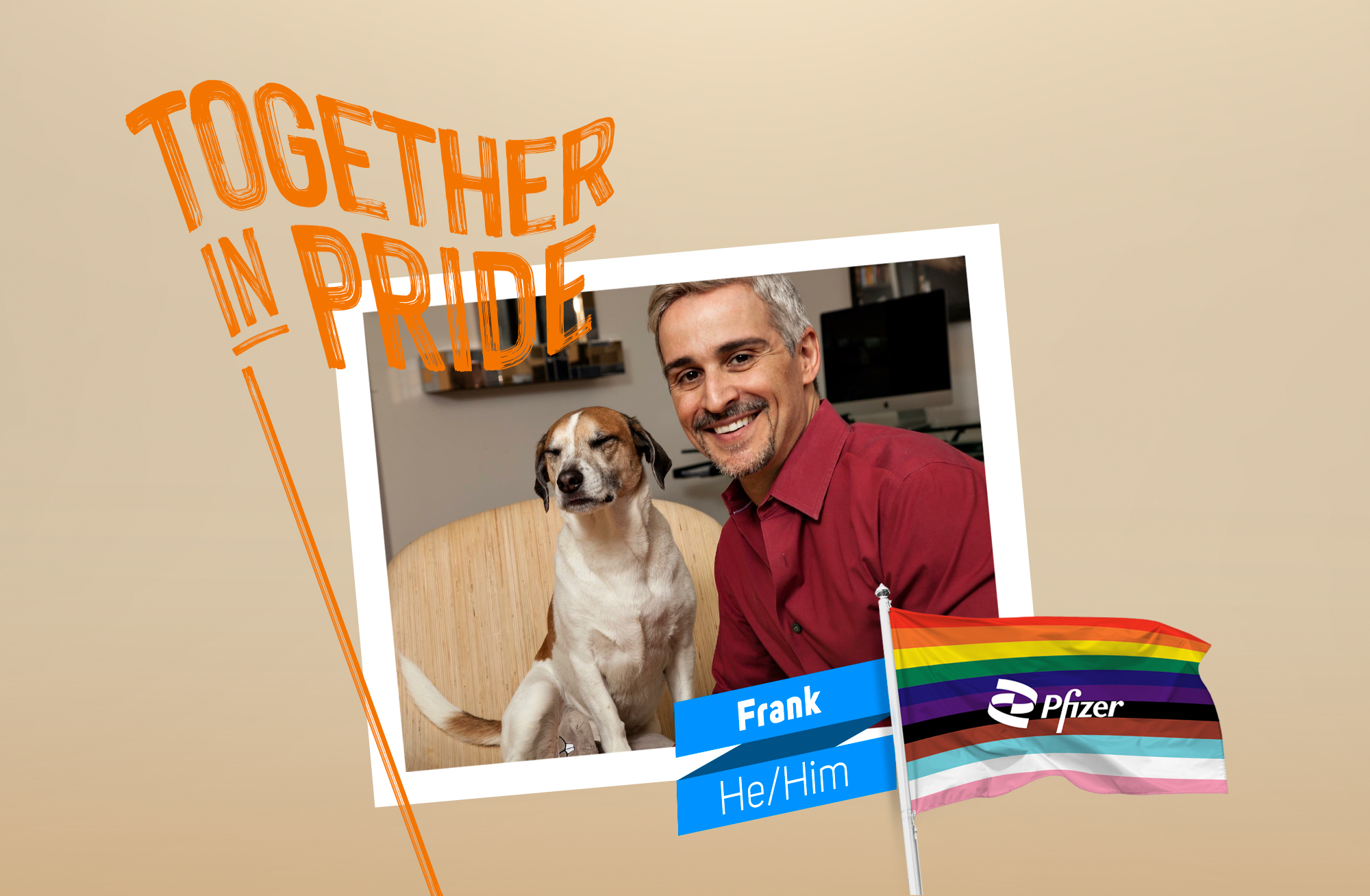
“Visibility at any cost,” is a quote from the film “The Celluloid Closet,” a documentary surveying Hollywood’s depiction of LGBTQIA+ individuals throughout the history of American film. Upon its release in 1995, I didn’t agree with the actor and playwright Harvey Fierstein when I heard him say it. Having grown up closeted – desperately concealing my homosexuality – the thought of visibility, particularly negative representation – and there were many negative gay stereotypes in television and film already – made me feel uneasy and frightened.
The thought of being outed was terrifying.
It wasn’t until I graduated from medical school and began treating people with HIV in Manhattan that I understood that silence equaled death. It was early 2000, and I had grown up hearing about HIV and AIDS. Fortunately, I began treating people living with HIV after the advent of antiretroviral medications. Still, I observed prejudice from government officials and policy makers, from ignorant and ill-informed people, and I understood that the only way to make progress was to live as an out and proud person. Harvey Fierstein was right all along. Visibility, even negative, was better than nothing.
Art has a way of holding up a mirror to show our existence. Being the only son of Italian immigrants, I hungered to understand “who am I?” because I was unlike the family that raised me. Watching television and film, I desperately searched for characters who informed me of the man I’d become. Though, most times, these characters were never identified as gay. Moreover, they were often depicted as “sissies.” That didn’t matter; I no longer felt alone.
As an adult, feeling empowered to show up in life as my authentic self has propelled me to excel. Working at Pfizer, I feel not an ounce of hesitation in being a proud, gay, married man with two four-legged sons. My pride bolsters my confidence and enables me to shepherd the next generation of LGBTQIA+ colleagues who might be searching, like I had, for representation. Together in Pride means I see you. We see each other, and because of our shared experience, we can set that aside and show up at Pfizer without concern for acrimony or judgment.
It is our responsibility to keep alive the legacy of the LGBTQIA+ folks before us, who laid the groundwork so I can live out and proud. And for us to set a new path with positive representation; a light of hope for those children who might be sitting alone in their bedrooms asking themselves, “who am I?”
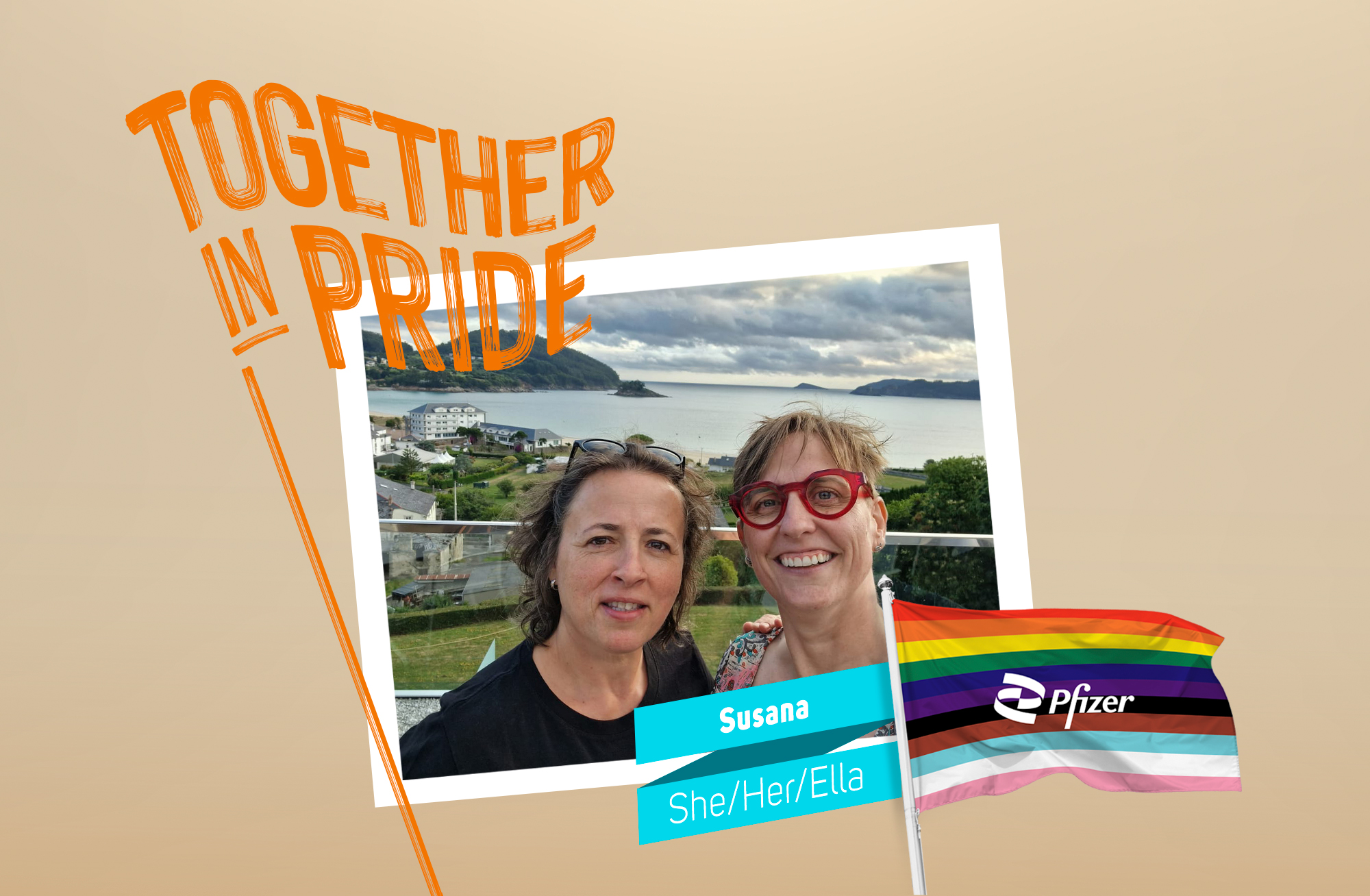
I was born into a traditional family the same year the dictatorship in Spain came to an end. Throughout my happy childhood, I grew up in a stable family environment, filled with the new prospects and hopes for change that were happening in the country as those were the beginning of the Democracy. It was the typical scene of a Spanish family of that time.
My story truly began during my teenage years. It's a period of change where you question many things, even the reason of our existence. When I was sixteen, I had my first boyfriend, and like all those teenage romances, it was fleeting. I hadn't defined myself yet, and honestly, at that time, I was only focused on my studies and playing basketball.
However, a few years later, I had my first relationship with a girl. It was then, beyond those teenage thoughts, when I began to brood on my feelings, not fully defining myself, but realizing that I didn't feel like others around me. It was not "normal." And of course, my parents knew nothing about it; I didn't share any of those feelings with them. It was the 1990’s. And I wondered, what is the "normal?"
I started working and continued to keep that part of me hidden. While my colleagues discussed their weekends with their partners and families, I always avoided mentioning the word "partner" and kept my private life hidden at work. The fear of being labeled "the lesbian," or hearing comments or jokes about gay people, made me increasingly introverted about my private life.
After several years of living a double life, I decided to come out to my parents when I met my current partner. The reaction was better than expected, although with nuances. My mother simply said, "Well, I would have preferred if it were a man, but if it's what you want." Those words still resonate in my mind because I know that she respects it, but she still struggles to accept it. I know we all need our time to digest or accept some news. So, I must also respect that.
That same year, I decided to tell my friends and stop hiding. If anyone had a problem with it, the issue was not with me, but with those who did not respect my way of feeling. This was not an easy task, but it was an introspection that led me to understand that I deserved to live and share my happiness with those I love. The reactions were fantastic, and my happiness grew as I continued moving forward with them as allies.
So much that when my wife and I decided to get married, that day remains the happiest of my life. Sharing those moments with the people I love and who have walked with me through all my life's stages. As I usually say, life is like a bus; there are people who get on and go with you on the route but get off at the next stop; there are others who get on and travel with you until the end of the journey; and there are others who don't get on the bus at all. Right now, I'm at a point where I don't want to get off the bus and I want to continue discovering what this journey has in store for us.
Years later an opportunity came to be part of the Diversity and Inclusion Council at the PGS plant in Algete where I’m based in Madrid. At that moment, I realized I had an opportunity to collaborate and contribute my part to making our society and our country more diverse and inclusive. One of the initiatives we came up with to celebrate Pride Month and give visibility to the LGBTQI+ community, was a conversation among colleagues at a coffee machine where we talked about our experiences with LGBTQI+ friends or family members. It was then that I decided to step forward and share my happiness in the place where I had been working for the last 17 years. That's where my marriage became known. The reactions were amazing and very positive. I couldn't believe that the fear that had prevented me from speaking for so long had now vanished and turned to a feeling of relief and well-being.
I feel incredibly fortunate for many reasons: I have a lovely family that gives meaning to my daily life; I have a life partner with whom projects never cease; I have a job that continues to bring me very positive things and from which I learn every day. Moreover, I live in a country where significant progress has been made in diversity over the last 15 years, where our rights are recognized. In 2023, Spain was ranked fourth in defending LGBTQI+ rights according to the Rainbow Europe ranking. And I’ve even had the opportunity to tell my story here. Hopefully this could help other colleagues to come out and share their hidden happiness, who knows?
I'm not a friend of labels. I refuse to define or label myself because we shouldn't be categorized. In the end, we are people and relationships should be based on respect and empathy, regardless of sexual orientation, gender identity or expression, age, race, or the country where we were born or live. We are a collection of multiple identities, multiple personalities, multiple choices, and decisions, and therein lies the beauty of diversity. There's no a magic formula: Respect and empathy are always a winning combination. And this for me is where this year's motto, 'Together in Pride,' makes more sense.
Someday it will not be necessary to give visibility to these stories because they will be a result of normality. We are taking steps to make sure that day comes soon for everyone in all countries, but there are still barriers to overcome. I hope that the new generations can feel the freedom and enjoy the opportunities of a diverse and equal society. That's the legacy I wish to leave behind.
I would like to conclude with some words from a famous Spanish poet paying tribute to those who fought for LGBTQI+ rights and for achieving a more fair, diverse, and inclusiveness society in my country and around the world. Also, to those who couldn't or weren't allowed to make their sexual orientation, gender identity or expression visible. And to all those who are still hidden and don't feel the freedom to share their story or are frustrated, hoping that this testimony will help them take that step:
"You will never understand the love I feel, for you sleep in me, for you are asleep. And I try to hide you, even as I weep, haunted by a voice of penetrating steel." – “The Beloved Sleeps on the Poet’s Breast,” Federico García Lorca
07.23.2025
07.02.2025
07.01.2025
06.20.2025
06.13.2025
